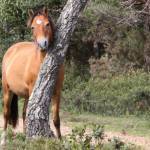Pinworms in Horses

Pinworms generally cause few problems for horses except for tail rubbing. Female pinworms emerge from the anus and lay their eggs in a sticky film. This can make horses itchy, and they then rub their tails. It is not uncommon to observe horses still rubbing their tails or even adult pinworms in the manure after horses are dewormed with a dewormer (anthelmintic ) that is approved to treat pinworms. Theories of apparent pinworm resistance include the development of anthelmintic resistance over time or that pinworms are not as susceptible to dewormers as once thought. It is also important to rule out other causes of tailhead rubbing such as allergies and dermatitis.
Reinemeyer and others (2010) studied the efficacy of ivermectin (label dose) and pyrantel pamoate (double the usual deworming dose or the dose commonly used against tapeworms) in horses with pinworm infections. Both ivermectin and pyrantel pamoate were greater than 90% effective to remove adult pinworms, compared to horses that were not dewormed. This demonstrated the desired efficacy of both anthelmintics against adult pinworms. Other studies reported that pinworms that survived treatment with ivermectin could be removed when the horses were dewormed again with pyrantel pamoate.
Pinworm infections can be difficult to confirm unless adult worms are seen in the manure of infected horses. Fecal flotation as performed for other parasites may not identify pinworm infections because female worms lay their eggs outside the horse’s rectum. To most reliably diagnose pinworm infections, the area around the horse’s anus can either be scraped or clear adhesive tape can be applied at several spots around the anus. The tape or scraping is examined microscopically to look for pinworm eggs.
If pinworms or signs of pinworms are still observed after deworming, then using a different dewormer from another drug class may be effective. The most common reason for apparent lack of dewormer efficacy is underdosing the horse. It is very important to obtain an accurate weight and avoid underdosing for the best results. Consult your veterinarian for the best advice to diagnose and treat pinworm infections.
Reinemeyer, C.R., J.C. Prado, E.C. Nichols, and A.A. Marchiondo. 2010. Efficacy of pyrantel pamoate and ivermectin paste formulations against naturally acquired Oxyuris equi infections in horses. Veterinary Parasitology 171:106-110.








